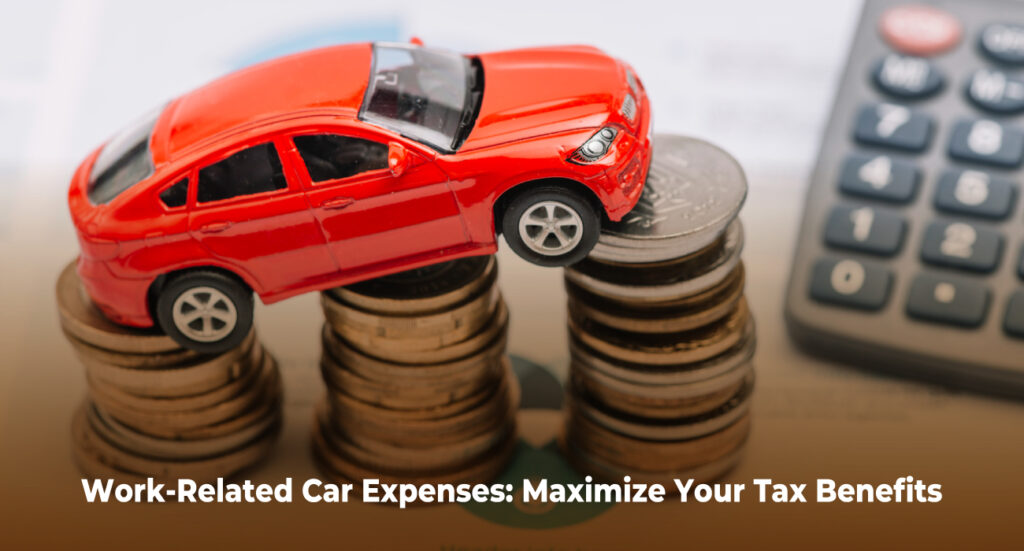Work-Related Car Expenses: Maximize Your Tax Benefits
Work-related car expenses can often be confusing, with the task of keeping receipts, maintaining a logbook, and tracking mileage in a diary being particularly daunting for many taxpayers. Consequently, many individuals seek our guidance to understand the intricacies of what can and cannot be claimed. In this article, we will comprehensively summarize the allowable and non-allowable claims related to your car or motor vehicle, providing clarity on essential aspects such as fuel, maintenance, insurance, and depreciation. Our goal is to simplify the process and help you maximize your eligible deductions while ensuring compliance with tax regulations.

Who Can Claim?
You can only claim car expenses as a tax deduction if you satisfy the following criteria:
- The vehicle must be a car that carries a load of less than 1 tonne and fewer than nine passengers, including the driver.
- It cannot be a motorcycle or similar vehicle.
- You must own or lease the car.
- It cannot be under a novated lease or salary sacrifice arrangement.
Can you claim the car expense if your spouse or parents or siblings own the vehicle?
Yes, you can. If you use a car owned by a family member and can demonstrate a private arrangement that makes you the owner or lessee of the car (even if you aren’t the registered owner), you can work out your car expenses as though it is your car.
Example: private arrangement
When Sunny turned 18, he bought a car from his parents for $1,000. He now pays the insurance, fuel, registration, and other running costs, and no one else uses the car. However, the registration has not been updated and the car is still registered in his mother’s name. Sunny is eligible to claim his work-related car expenses even though the registration has not been changed to his name.

Can you Claim Trips Between Home to Work?
No, you can’t claim trips between your home and place of work, even if you have the following:
- live a long way from your regular place of work
- work outside normal business hours – for example, shift work or overtime
- do minor work-related tasks on the way to work or the way home – for example, picking up the mail
- go between your home and regular place of work more than once a day
- are on call – for example, you are on standby duty and your employer contacts you at home to come into work
- have no public transport near where you work
- do some work at home
- work from your home running your own business and travel directly to a place of work where you work for somebody else.
Exception for Trips Between Home to Work Claim
According to the ATO, there are some circumstances where you can claim a deduction for the cost of trips between home and work. The eligibility conditions are –
Home is a base of employment – If your home is the base of your employment and you have to travel to your employer’s premises for any reason, the travel is tax deductible. However, you must meet the following conditions:
- You’re required to start your employment duties at home then travel to your regular place of work to complete those particular duties.
- Undertaking the work in 2 locations is necessary due to the nature of your employment duties.
- The trip to your regular place of work isn’t part of a normal trip to work that would have occurred anyway.

Transporting bulky tools and equipment – You can claim a deduction for the cost of trips between home and work if you need to carry bulky tools or equipment. The conditions are that the tools or equipment must be essential for your work, awkward to transport due to their size and weight, and can only be conveniently transported using a car. Additionally, there must be no secure storage at your workplace, and you must not transport the tools or equipment as a matter of choice.
Itinerant or shifting places of work – If you do itinerant work, meaning you have shifting places of work, you can claim transport expenses incurred for trips between your places of work and your home. Several factors indicate you do itinerant work: travel is a fundamental part of your job, not merely for convenience; you have a ‘web’ of workplaces to visit throughout the day without a fixed location; you regularly work at multiple sites before returning home; your work site locations are often uncertain; and your employer pays you a travel allowance to cover the costs of continually traveling between work sites.
What are Work Related Trips?
You can claim a tax deduction for your car trips to:
- perform your work duties – for example, if you travel from your regular place of work to meet with a client
- attend work-related conferences or meetings away from your regular place of work
- deliver items or collect supplies
- go between 2 or more separate places of employment, such as if you have more than one job (but not if one of the places is your home)
- go from your
- regular place of work to an alternative place of work that isn’t a regular place of work (for example, a client’s premises) while still on duty, and back to your regular place of work or directly home
- home to an alternative place of work that isn’t a regular place of work to perform your duties, and then to your regular place of work or directly home (this doesn’t apply if the alternative place of work has become a regular workplace).
You can claim car expenses if you travel for work or business. You can claim following part of your car trips or mileage –

Methods of Car Claims
You can use one of the following Methods to claim your car expenses for work related travel:
- Cents per KM
- Logbook (Actual Expense)
Cents Per Kilometre Method
The cents-per-kilometre method covers registration, insurance, fuel, depreciation, repairs, and maintenance, all bundled into a single rate provided by the ATO each year. If you use the cents-per-kilometre method, you cannot claim any other costs related to the vehicle.
What can you claim?
- Up to 5,000 work-related kilometres
- The rate for the 2024-2025 financial year is 88 cents per kilometre
What records should you keep?
- No receipts or invoices are required for this claim
- Trips should be recorded in a diary or
- In the ATO app
Logbook Method
This method allows you to claim actual running expenses and depreciation of the car. The requirements are:
- Keep a 12-week continuous travel diary/logbook.
- Include both personal and business travel in the logbook.
- Record odometer readings at the start and end of the logbook period.
- Keep all invoices and receipts related to the vehicle, including registration, insurance, repairs, etc.
- Maintain receipts for your fuel and oil expenses or keep a record of your reasonable estimate of these expenses based on the odometer readings at the start and end of the period for which you are claiming.
Your logbook is valid for 5 years. However, if your circumstances change (e.g., you change jobs or move to a new house) and the logbook is no longer representative of your work-related use, you will need to complete a new 12-week logbook.
Understanding the complexities of work-related car expenses is crucial for maximizing your tax deductions. Knowing what you can and cannot claim, from tracking mileage to maintaining a logbook, can make a significant difference. If you’re feeling overwhelmed or uncertain about your car expense claims, our team at Investax Group is here to help. Our tax specialists are experts in legally reducing your tax burden and ensuring you get the maximum benefits you’re entitled to. Contact Investax Group to schedule a consultation and let us guide you through the process with confidence and ease.
General Advice Warning
The material on this page and on this website has been prepared for general information purposes only and not as specific advice to any particular person. Any advice contained on this page and on this website is General Advice and does not take into account any person’s particular investment objectives, financial situation and particular needs.
Before making an investment decision based on this advice you should consider, with or without the assistance of a securities adviser, whether it is appropriate to your particular investment needs, objectives and financial circumstances. In addition, the examples provided on this page and on this website are for illustrative purposes only.Although every effort has been made to verify the accuracy of the information contained on this page and on our website, Investax Group, its officers, representatives, employees and agents disclaim all liability [except for any liability which by law cannot be excluded), for any error, inaccuracy in, or omission from the information contained in this website or any loss or damage suffered by any person directly or indirectly through relying on this information.
Reference
ATO – Vehicle isn’t yours
ATO – Home to Work related Claim
ATO – Home and Work Exception





